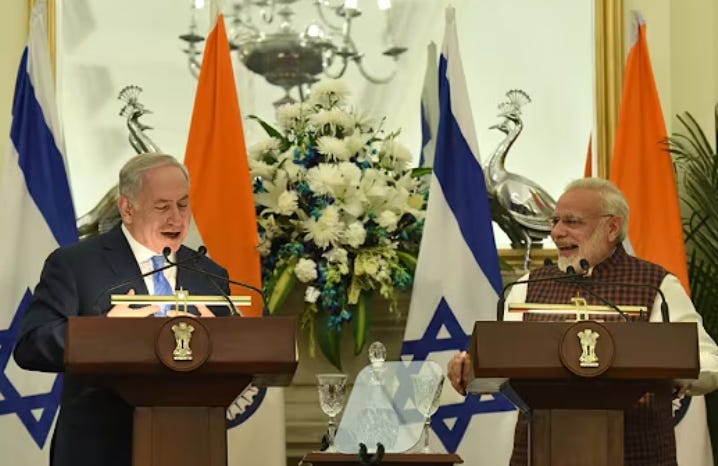Hindutva Meets Zionism: The Ideological Roots of Today’s India–Israel Axis
Description

In 1938, Mahatma Gandhi famously declared, "Palestine belongs to the Arabs in the same sense that England belongs to the English or France to the French." His words reflected a broader current of Indian sympathy for Palestinian aspirations during the colonial era. Jawaharlal Nehru, who would become India's first prime minister, likewise acknowledged the conflicts Jews had with gentiles across Europe but maintained that "fundamentally the problem of Palestine is a nationalist one. The Arabs are struggling against imperialist control and domination. It is a pity, therefore, that the Jews of Palestine instead of aligning themselves with this struggle have thought it fit to take the side of British imperialism and to seek its protection against the inhabitants of the country."
These statements captured India's early position with respect to Israel vis-à-vis Palestine. Before independence, India consistently endorsed Arab self-determination in Palestine. In 1947, India was one of only 13 nations to oppose the United Nations’ Partition Plan. Sir Abdur Rahman, the representative for India at the United Nations Special Committee on Palestine (UNSCOP), argued, "The people of Palestine have now admittedly reached a stage of development where their recognition as an independent nation can no longer be delayed. They are in no way less advanced than the people of the other free and independent Asiatic countries." He warned that failure to grant independence would perpetuate violence.
India recognized Israel in 1950, yet its Cold War alignment with the Soviet Union and leadership role in the Non-Aligned Movement kept relations minimal. India consistently sided with Arab states, backing Egypt during the 1956 Suez Crisis and becoming the first non-Arab country to recognize the Palestine Liberation Organization in 1974. The following year, India authorized a PLO office in New Delhi, and in 1988 it officially recognized the State of Palestine.
This decades-long solidarity with Palestine only shifted after the Soviet collapse. In 1992, Prime Minister P.V. Narasimha Rao's government established full diplomatic relations with Israel. His decision, influenced by RSS figure Bhaurao Deoras, represented a turning point. India continued to voice support for Palestine in international forums, but its practical ties with Israel rapidly expanded.
Hindutva: Ideological Roots of a New Alignment
The ideological convergence of Hindu nationalism and Zionism predates the foundation of Israel and India. The Rashtriya Swayamsevak Sangh (RSS), founded in 1925 by Keshav Baliram Hedgewar has always admired Israel as a model for ethno-religious nationhood. As a Hindu nationalist volunteer paramilitary organization, the RSS is the ideological parent of the Bharatiya Janata Party (BJP) and the center of the broader Sangh Parivar network.
Vinayak Damodar Savarkar, the father of Hindutva, expressed explicit admiration for Zionism. In the Essentials of Hindutva, he declared: "If the Zionists' dreams are ever realised — if Palestine becomes a Jewish state — it will gladden us almost as much as our Jewish friends." After Israel's creation in 1948, he stated,"I am happy that most of the four countries have given the Jewish people the right to establish a Jewish state of their own in Palestine and have provided them with arms for that."
Savarkar condemned India's anti-Zionist position during the early days of the formation of the Jewish state. He lamented that "it is... to be regretted that the delegation which represented our Hindusthani Government in the UNO should have voted against the creation of the Jewish State," and celebrated Israel as a force to "checkmate the aggressive tendencies of Moslem fanaticism in general."
Madhav Sadashiv Golwalkar Golwalkar, RSS chief from 1940 to 1973, likewise praised Jewish nationalism. He described Palestine as "the natural territory of the Jewish people, essential to their aspiration for nationhood," and admired the Jews for maintaining their "religion, culture and language." As early as 1930, Golwalkar remarked, "The reconstruction of the Hebrew Nation in Palestine is just an affirmation of the fact that Country, Race, Religion, Culture, and Language must exist unavoidably together to form a full Nation idea."
Deen Dayal Upadhyaya, co-founder of the Jan Sangh (the BJP's predecessor), echoed this praise in Integral Humanism (1965): "Israeli Jews lived for centuries with other peoples scattered far and wide, yet they did not get annihilated in the societies in which they lived." He emphasized Jewish resilience, concluding, "When a group of persons lives with a goal, an ideal, a mission, and looks upon a particular piece of land as motherland, this group constitutes a nation."
From Ideology to State Policy
The rise of the BJP transformed these ideological sympathies into policy. Prime Minister Atal Bihari Vajpayee deepened ties, sending Home Minister L.K. Advani to Israel in 2000 and hosting Ariel Sharon in India in 2003.
The transformation from ideological sympathy to practical alliance found its embodiment in Lieutenant General Jack Farj Rafael Jacob, the highest-ranking Jewish officer to serve in the Indian Army throughout its history. Born to a Baghdadi Jewish family, Jacob's most celebrated achievement came during the 1971 Bangladesh Liberation War, where he served as Chief of Staff of the Eastern Command. His strategic planning and execution were instrumental in one of





